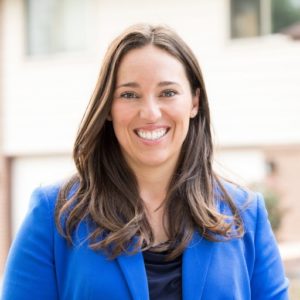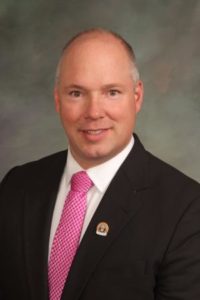DENVER–A bill to allow counties to regulate and tax cigarettes and other nicotine-containing products like cigars and vaping products passed the state House of Representatives on second reading Tuesday on a voice vote.
House Bill 19-1033, sponsored by Rep. Kerry Tipper (D-Lakewood) and Rep. Chris Kennedy (D-Lakewood) allows counties and local jurisdictions to “impose regulations on cigarettes, tobacco products, or nicotine products that are more stringent than statewide regulations.” The bill explicitly allows counties to prohibit sales of nicotine-containing products to persons under 21.
Kennedy says the bill is aimed at reducing what he called the “teen vaping epidemic.” He said, “Data shows that 26 percent of high school students in Colorado use E-cigarettes, that is the highest rate in the nation. We know that this is a health issue in and of itself, but it also makes students six times more likely to start smoking actual cigarettes in their lives.”

Co-sponsor Kerry Tipper said, “This bill really does two things, it removes that privileged status [of the tobacco industry], and number two it treats all local governments equally so it restores full local control, treats counties, statutory cities and home rule cities the same so that they’re empowered with the tools that they need to actually combat vaping and teen tobacco use.”
Tipper is referring to legislation that dissuades local jurisdictions from imposing taxes, fees, regulations or licenses on tobacco retailers by offering them a 27 percent share-back of state tobacco sales taxes.
To qualify for the tax dollar distributions however, “units of local government are prohibited from imposing fees, licenses, or taxes on any person as a condition for engaging in the business of selling cigarettes or from attempting in any manner to impose a tax on cigarettes.”
This was a compromise hammered out in the Legislature after long and contentious attempts by anti-smoking advocates to ban smoking and restrict tobacco sales and use beginning about 1977.
Some $300 million in tobacco taxes have been collected since the share-back program started according to statistics cited from the Colorado Department of Revenue by opponents of the bill.
While any new local taxes would have to be taken to the ballot to comply with the Taxpayer’s Bill of Rights (TABOR), new fees could be enacted or raised at any time without voter approval. The authority to regulate and license all retail sales, not just teenage vaping, would lie with elected governing bodies.
Tipper said that the push to allow local jurisdictions to set age limits is in part intended to reduce the availability of vaping products to underage teens by widening the age gap between minors and adults who might be persuaded to buy vaping products for them. She said that the majority of minor vapers obtain products through social channels, not from stores.
She hopes that by making the minimum age 21 there will be fewer people willing to buy vaping products for minors, but acknowledged that parents are one of the sources of vaping products.
Vaping advocates argued that vaping is much safer than smoking cigarettes and that higher taxes and age limits will have harmful unintended consequences.
Jordan Wheeler, representing J-Vapes said, “If you tax vaping products at a higher rate you will discourage vapers who have chosen a 95 percent safer product and lead them back to smoking traditional cigarettes and they are going to die because of it.” Many of his customers are older people on fixed incomes who have turned to vaping as a safer alternative after being addicted to tobacco long ago.
Objections were heard from convenience store representatives who said that they train their employees not to sell tobacco or vaping products to minors, citing a compliance rate of over 98 percent.
Premium cigar and pipe tobacco representatives told the committee that minors are not even allowed in their stores and that the tax burden on cigars is already very high.
Despite the high compliance rate and other efforts to prevent teen tobacco use, bill supporters made it clear they want to increase the burden of responsibility on retailers. Responding to comments by Grier Bailey, director of the Colorado Petroleum Marketers and Convenience Store Association, Rep. Sonya Jaquez Lewis, D-Boulder said, “We lead the country in kids who vape. I really don’t care how they are getting their hands on it. I think organizations like yours need to do more about it.”
Not all lawmakers agree with that sentiment. Rep. Susan Beckman (R-Littleton) said, “The… premium cigar business owners… are very concerned [that this] is death by a million cuts. The tax on premium cigars is 40 percent of the manufacturer’s selling price.”
House Minority Leader Patrick Neville said in a statement to Complete Colorado, “Allowing governments to ban a private business from selling a cigar to a 20-year-old soldier who is returning from war is clearly out of touch.”

“We shouldn’t be empowering local governments to have more control over our citizens. This isn’t local control,” Neville said during the House floor debate.
Rep. Matt Soper R-Delta said, “Every single county could have a different age at which you could buy tobacco products. What that creates is a patchwork of regulations. It should be uniform.”
“I don’t think kids in one county are more inclined to smoke than in other counties,” said Rep. Marc Catlin R-Montrose, “Eighteen years old you’re old enough to do what a man needs to do, serve your country and do the things that we ask of citizens. There are better ways to do this.”
If local jurisdictions in Colorado raise the age to purchase tobacco products to 21, it will likely be one of the highest age restrictions in the nation.
The bill now moves on to the state Senate. The Senate sponsors are Sen. Rhonda Fields (D-Aurora) and Sen. Kevin Priola (R- Adams County).



Pingback: Local regulation of tobacco and vaping bill passes Colorado House, allows for patchwork of rules around the state – Complete Colorado – Novelty Pipe up
Pingback: Local regulation of tobacco and vaping bill passes Colorado House, allows for patchwork of rules around the state – Complete Colorado – Vaping News